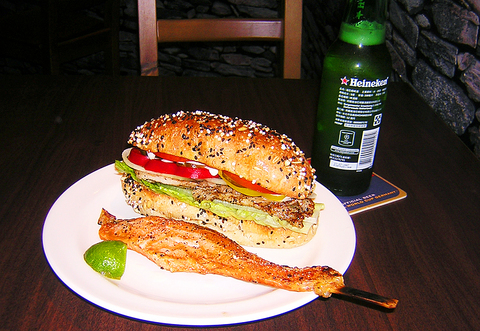Stiff competition has lead many restaurateurs to come up with strange concepts to attract attention. There's the Jailhouse, where customers sit in mock prison cells. And there's Marton, where you eat from toilet bowls and the food looks like shit — literally.
Then there's Duke, named after the man who inspired the Dracula legends, Vlad Draculea, aka Vlad the Impaler, a 15th-century Romanian prince and notorious torturer who reportedly had 20,000 prisoners skewered on stakes near his capital and left them rotting there to demoralize an invading Turkish army.
The sign outside displays the silhouette of a castle, bats and what appears to be splatters of blood. Inside there are stained glass windows with gothic portraits hanging from the faux stone walls.

PHOTO: RON BROWNLOW, TAIPEI TIMES
But Duke, which is located inside the triangle formed by Roosevelt, Xinhai and Xinsheng South roads, doesn't serve Transylvanian food. The reality, it turns out, is more pedestrian: Duke makes really good sandwiches. You can also get a good hunk of marinated meat on a stick.
“We chose this theme for our restaurant because the Chinese translation of Dracula's name is ‘Skewered Meat Duke’ (肉串公爵),” said Chia Shang-hsuan (賈尚軒), 31, who runs Duke with his cousin. “But really, we're not that scary.”
Indeed the only frightening thing about Duke is that hopefully it will scare nearby restaurants and cafes into improving their sandwiches.
To order a sandwich at Duke, you first choose the meat, chicken, beef, lamb or pork, all of which have been marinated for up to four hours. You then choose from one of five kinds of bread. The loaves are homemade and contain no preservatives. The meat is basted on the grill for roughly five minutes, then topped with pickles, red and yellow peppers, and a sauce.
“In Taiwan, grilled meat is usually Japanese-style. Ours has a Western flavor,” said co-owner Marx Song (宋凱程), 32, who worked as a chef in a Taidung hotel before opening the restaurant.
A sandwich and a drink from Duke's takeout window downstairs, which closes around 11pm, costs NT$125. With a skewer of grilled meat or vegetables the meal costs NT$170. Prices are slightly higher upstairs.
Like a vampire, Duke keeps weird hours. Song said this was because lunchtime customers in the area do not want to wait for their food.

On April 26, The Lancet published a letter from two doctors at Taichung-based China Medical University Hospital (CMUH) warning that “Taiwan’s Health Care System is on the Brink of Collapse.” The authors said that “Years of policy inaction and mismanagement of resources have led to the National Health Insurance system operating under unsustainable conditions.” The pushback was immediate. Errors in the paper were quickly identified and publicized, to discredit the authors (the hospital apologized). CNA reported that CMUH said the letter described Taiwan in 2021 as having 62 nurses per 10,000 people, when the correct number was 78 nurses per 10,000

As we live longer, our risk of cognitive impairment is increasing. How can we delay the onset of symptoms? Do we have to give up every indulgence or can small changes make a difference? We asked neurologists for tips on how to keep our brains healthy for life. TAKE CARE OF YOUR HEALTH “All of the sensible things that apply to bodily health apply to brain health,” says Suzanne O’Sullivan, a consultant in neurology at the National Hospital for Neurology and Neurosurgery in London, and the author of The Age of Diagnosis. “When you’re 20, you can get away with absolute

May 5 to May 11 What started out as friction between Taiwanese students at Taichung First High School and a Japanese head cook escalated dramatically over the first two weeks of May 1927. It began on April 30 when the cook’s wife knew that lotus starch used in that night’s dinner had rat feces in it, but failed to inform staff until the meal was already prepared. The students believed that her silence was intentional, and filed a complaint. The school’s Japanese administrators sided with the cook’s family, dismissing the students as troublemakers and clamping down on their freedoms — with

As Donald Trump’s executive order in March led to the shuttering of Voice of America (VOA) — the global broadcaster whose roots date back to the fight against Nazi propaganda — he quickly attracted support from figures not used to aligning themselves with any US administration. Trump had ordered the US Agency for Global Media, the federal agency that funds VOA and other groups promoting independent journalism overseas, to be “eliminated to the maximum extent consistent with applicable law.” The decision suddenly halted programming in 49 languages to more than 425 million people. In Moscow, Margarita Simonyan, the hardline editor-in-chief of the